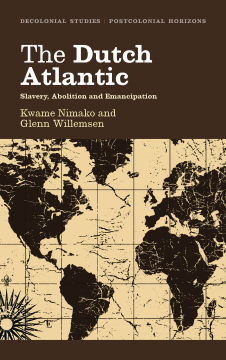
Additional Information
Book Details
Abstract
This book interrogates the Dutch involvement in Atlantic slavery and assesses the historical consequences of this for contemporary European society.
Kwame Nimako and Glenn Willemsen show how the slave trade and slavery intertwined economic, social and cultural elements, including nation-state formation in the Netherlands and across Europe. They explore the mobilisation of European populations in the implementation of policies that facilitated Atlantic slavery and examine how European countries created and expanded laws that perpetuated colonisation.
Addressing key themes such as the incorporation of the formerly enslaved into post-slavery states and contemporary collective efforts to forget and/or remember slavery and its legacy in the Netherlands, this is an essential text for students of European history and postcolonial studies.
'A fundamental addition to a distinguished genealogy of work - from Ottobah Cugoano to Eric Williams and Jean Casimir - a genealogy in which scholarship and experientia Africana meet'
Walter Mignolo, William H Wannamaker Distinguished Professor in Literature and Romance Studies at Duke University
'This erudite history of Dutch slavery, revolts, abolition efforts, and emancipation is told from the underside of Dutch life. ... [It is] a breathtaking portrait of an uncomfortable history, an agonising story to be told and never forgotten'
Lewis R. Gordon, Laura H. Carnell Professor of Philosophy and Jewish Studies and Founding Director of the Institute for the Study of Race and Social Thought and the Center for Afro-Jewish Studies at Temple University
Table of Contents
| Section Title | Page | Action | Price |
|---|---|---|---|
| Cover | Cover | ||
| Contents | vii | ||
| Acknowledgements | ix | ||
| Foreword | xii | ||
| Preface | xix | ||
| 1. Introduction, Goals and Issues | 1 | ||
| Introduction and Goals | 3 | ||
| Context and Concepts | 4 | ||
| Importance and Relevance | 6 | ||
| Overview of Chapters | 8 | ||
| 2. Transatlantic Slavery and the Rise of the European World Order | 13 | ||
| The Age of Banditry (1492-1648) | 14 | ||
| Sovereignty and Chattel Slavery (1648-1789) | 20 | ||
| Citizenship, Slavery and the 'Free Soil Ideology' | 29 | ||
| Science and Chattel Slavery | 41 | ||
| 3. Chattel Slavery, Sugar and Salt | 52 | ||
| Slavery and the Making of Global Economy | 52 | ||
| Slavery and Sugar | 60 | ||
| Sugar and Suriname | 64 | ||
| Pacification and Resistance | 77 | ||
| 4. Abolition without Emancipation | 87 | ||
| European and Systemic Context | 87 | ||
| From Regulation to Intervention | 90 | ||
| Modalities of Abolition: Progressive Control Versus Transformative Change | 97 | ||
| Abolition and Citizenship | 112 | ||
| 5. Trajectories of Emancipation: Religion, Class, Gender and Race | 123 | ||
| Religion and Emancipation | 125 | ||
| Class and Emancipation | 128 | ||
| Gender and Emancipation | 131 | ||
| Race and Emancipation | 134 | ||
| The Immediate Aftermath of Abolition | 147 | ||
| 6. The Legacy of Slavery: The Unfinished Business of Emancipation | 149 | ||
| Memory and Dignitarianism | 150 | ||
| Commemorators and Commemoration | 158 | ||
| Integration and Multiculturalism | 164 | ||
| Ninsee as a Contested Project | 170 | ||
| Museums and Galleries | 175 | ||
| Reparations | 178 | ||
| Anniversaries and Apologies | 181 | ||
| 7. Conclusion: Parallel Histories and Intertwined Belonging | 184 | ||
| Some Conclusions | 184 | ||
| A Final Note | 189 | ||
| Bibliography | 191 | ||
| Index | 201 |
